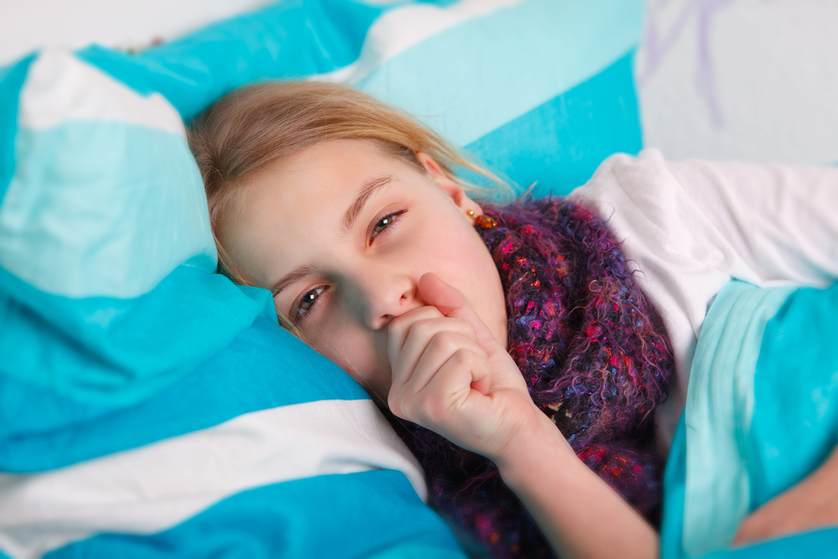Pneumonia is a lung infection caused by bacteria, viruses, parasites or fungi. It can affect one or both lungs. Pneumonia in kids is usually caused by a viral infection, which starts as an infection of the upper respiratory tract, progressing later into a lung infection. Due to an inflammation of the lungs, fluid is collected in the lungs, leading to breathing difficulties. Pneumonia in children could also result from an inhalation of a foreign object, usually food or stomach acid, in the lungs. Based on its severity, pneumonia varies from mild, moderate and even life-threatening.

What Are the Signs of Pneumonia in Children?
The signs of pneumonia depend on the type of pneumonia, child’s age, and overall health. In cases of a bacterial infection, the signs and symptoms will have a quicker onset compared to a viral infection. Common symptoms of pneumonia include:
- Cough
- Difficulties breathing
- Shortness of breath
- Chest pain
- Fever
- Chills
- Loss of appetite
- Abdominal pain near the rib cage
- Irritability
- Crying more than usually
- Pale or blue lips, finger, and toenails
When to Seek Immediate Care
You should seek immediate medical care:
- If your child has fever and is younger than 3 months old
- If your child is having difficulties breathing or wheezing
- If your child’s space around the neck and between the ribs pulls in during inhalation
- If your child is dehydrated. You can suspect a dehydration in cases when your child is crying without tears, is sleepier than usually, has a dry mouth and cracked lips, has urinated less than normal or has not urinated at all, is feeling dizzy, etc.
- If your child’s lips and/or nails have turned blue or gray
When to Contact Your Child’s Healthcare Provider
You should contact your child’s healthcare provider in the following case:
- If your child has a fever higher than 102 degrees Fahrenheit for children older than 6 months old, and higher than 100.4 degrees Fahrenheit for children younger than 6 months old
- If your child is constantly coughing
- If your child is vomiting
- If you are concerned about the health of your child
How Is Pneumonia Treated?
Professional Treatment
Physical examination is very important while diagnosing pneumonia in kids. Doctors check the appearance of the child, the breathing pattern and listen to the lungs for the presence of any abnormal sounds. Routinely ordered tests and examinations include complete blood count, chest X-ray, and even bacterial cultures of the mucus.
Once pneumonia is diagnosed, antibiotic treatment is needed. The type of antibiotic used will depend on the type of pneumonia your child has developed and the microorganism causing it.
Hospitalization might be needed in the following cases:
- Moderate or severe cases of pneumonia
- High fever
- Difficulties breathing
- Presence of a chronic illness which affects the immune system
- Need for oxygen therapy
- Lung infection which has spread into the bloodstream
- Vomiting
- Pneumonia reoccurring frequently from time to time
Hospitalized children with pneumonia usually receive intravenous antibiotic treatment and respiratory therapy. In severe cases of pneumonia, treatment in intensive care units (ICU) is necessary.
Home Care
Here are some simple things you and your family can do at home which will help your child recover faster:
- Keep a good personal hygiene of you, your family members and especially of your child.
- Clean your house regularly.
- Don’t smoke or allow anyone else to smoke around your child.
- Humidify the air in the house as breathing warm and moist air will help your child get rid of extra sticky mucus from the airways. Don’t use steam vaporizers as they can cause burns.
Eating and Drinking
In cases of pneumonia in kids, make sure that your child:
- Drinks plenty of breast milk or formula milk, if your child is younger than 12 months old.
- Drinks plenty of whole milk if your child is older than 12 months old.
- Drinks plenty of water, warm tea, apple juice or lemonade.
- Drinks chicken broth if your child is older than 12 months old.
Try to constantly feed your child in small amounts. Even if your child vomits, wait a couple of minutes and try to feed your child again.
OTC Medications
OTC medications such as ibuprofen will help relieve the signs and symptoms of pneumonia like fever, pain and even decrease the swelling and inflammation in the lungs. Never give any medication to your child under the age of 6 months old before consulting with your child’s healthcare provider.
Acetaminophen is another OTC medication commonly used among children. Read the labels carefully and give it to your child just as the directions instruct you. If you are still concerned about the dosage of acetaminophen you can give to your child, consult with your child’s healthcare provider first.
Giving a higher dosage than recommended could harm your child’s health. Ibuprofen can cause kidney problems and stomach bleeding, while acetaminophen can cause liver damage if not taken correctly.
How to Prevent Pneumonia in Kids
- Vaccinate your child on time – Various vaccines, such as Hib, chicken pox, flu, DTaP, pneumococcal vaccine, MMR, that your child should receive since childbirth all help prevent pneumonia.
- Keep a good personal hygiene – Make sure to wash the hands of your child, as well as, your own hands regularly in order to prevent any spread of the microorganisms. Avoid sharing kitchen utensils with your child. Clean your house regularly. Don’t forget to clean your child’s toys as well.
- Don’t smoke in the house – We all know that cigarette smoke is very bad for a person’s health, especially the health of a child. Children who live with a person who smokes tend to develop upper respiratory infections, lower respiratory infections, pneumonia, asthma and ear infections more often. Get necessary help and quit smoking.
